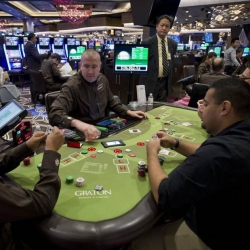
In the many months of controversy over who dominates California iPoker, all the operators have lost millions of dollars of online poker revenue.
A California online poker bill sponsored by Adam Gray was pulled back from a vote on Monday, giving negotiators more time to reach a consensus. The legislative decision was the latest in a years-long standoff over the future of online gambling in California.
The bill (AB 2863) stipulates a 5-year ban on ‘bad actors’, meaning companies which had violated federal gaming laws in the past could not enter the California online poker industry for a full five years. This could be waived if companies pay a $20 million fee. Opponents of the bill want a 10-year ban, along with a $60 million waiver fee.
Proponents and Opponents of AB2863
Suspension of a vote on Gray’s bill means its backers know they do not have the votes at present for passage. California’s horse racing industry and private card rooms in Los Angeles and elsewhere support Adam Gray’s online poker bill. So does a faction of the tribal gaming interests in California, led by the Morongo Band of Mission Indians.
Opposing the current legislation is the Pechanga Band of Luiseno Indians and the Agua Caliente Band of Cahuilla Indians, who lead a coalition of other tribes. The split has caused all previous online gambling proposals to founder.
Bad Actor Clause
The key passages in the bill are those regarding “bad actors”, defined in this case as those online gambling companies which continued to accept American players after the December 31, 20016 imposition of the UIGEA ban on online casinos, poker sites, and sportsbooks. The Pechanga and Agua Caliente argue that companies which profited from breaking US law from 2007 to 2011 should not be allowed to profit in a legal environment.
Though the discussion focuses on bad actors, everyone in the legislature knows the bad actor clause targets PokerStars. PokerStars is the number one online poker site, with 4 to 5 times more players than the second-place contender. PokerStars dominates any region it is allowed to operate.
Aimed at PokerStars
PokerStars continued to accept play from the United States when the UIGEA ban went into effect. It continued to do so until April 15, 2011, when a U.S. federal judge ordered an indictment unsealed which included executives from PokerStars, Full-Tilt Poker, and other top brands. The case stemmed from UIGEA violations, as well as subsequent charges that PokerStars conspired with smaller American banks to hide signups from U.S. residents.
Eventually, PokerStars settled its case with the United States government for over $700 million in fines. The Justice Department dropped its charges against the company itself, though PokerStars executives remained under indictment. Those executives likely never would have cleared their names without appearing before a U.S. court, so the company was barred from ever reentering the US gaming market.
Other U.S. Jurisdictions
That fact led to the sale of PokerStars to Amaya Inc., a Montreal-based gaming software company with 60 licenses in the United States. The situation meant PokerStars potentially was worth more to an outside group than it was to the original owners, because new ownership might be allowed back into the biggest gaming market in the world.
Amaya has succeeded in getting licensing for PokerStars in New Jersey, where the brand partners with Resorts Casino. Though Borgata and the Caesars Interactive brands had dominated the New Jersey online poker market since rollout in November 2013, the PokerStars/Resorts website won handily in its first month of operations–even with the other brands having nearly 2 & 1/2 years head-start on signing up players.
Pechanga and Agua Caliente’s Opposition
The specter of such dominance haunts Pechanga, Agua Caliente, and their allies. If PokerStars enters the market, they are likely to dominate California online poker. Thus, the majority of tribes seek to bar PokerStars from entering the market. Millions of dollars are on the line.
The Morongo Band and the Los Angeles card rooms side with PokerStars, because those gaming enterprises have deals with PokerStars in place. Their deals is much like the Resorts Casino deal in New Jersey. One side holds the gaming license, while the other side provides the software support, customer base, and knowledge of the online poker industry.
Daily Fantasy Sports Provisions
AB 2863 would legalize and regulate daily fantasy sports in California. The DFS industry currently is unregulated, but legal, in the Golden State. DFS companies like DraftKings and FanDuel have sought legalization since a wave of state attorney generals chose to ban the practice late in 2015 or early in 2016. So far, 8 U.S. states have passed regulations on the industry, while 7 have banned daily fantasy sports.
